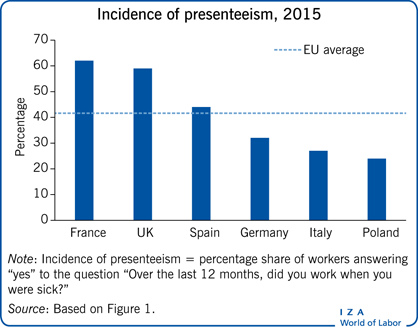Elevator pitch
Many workers admit that at times they show up for work even though they feel sick. This behavior, termed “presenteeism,” is puzzling since most workers do not incur financial losses when staying home sick. The various reasons behind presenteeism are person-related (e.g. individuals’ health or job attitude) or work-related (e.g. job demands and constraints on absence from work). Working when sick can have positive and negative consequences for workers’ performance and health, but it also affects co-workers’ well-being and firms’ productivity. There are various strategies as to how firms can address presenteeism.

Key findings
Pros
There is substantial variation of presenteeism across workers, firms, and countries.
If workers work when sick, firm productivity may be higher than when they stay home.
Individuals who work when sick reduce the burden on colleagues.
Working when sick may boost the recovery and rehabilitation of individuals.
Presenteeism can be addressed, among other things, by health promotion programs, workload reductions, and firms’ absence policies.
Cons
Working when sick can reduce individuals’ performance and firm productivity.
Sick workers may spread infectious diseases to co-workers.
Going to work when ill may exacerbate workers’ bad health status.
Working when sick is associated with a higher risk of future sickness absence.
Measures that stimulate presenteeism in the short term may increase workers’ sickness absence and disability in the long term.